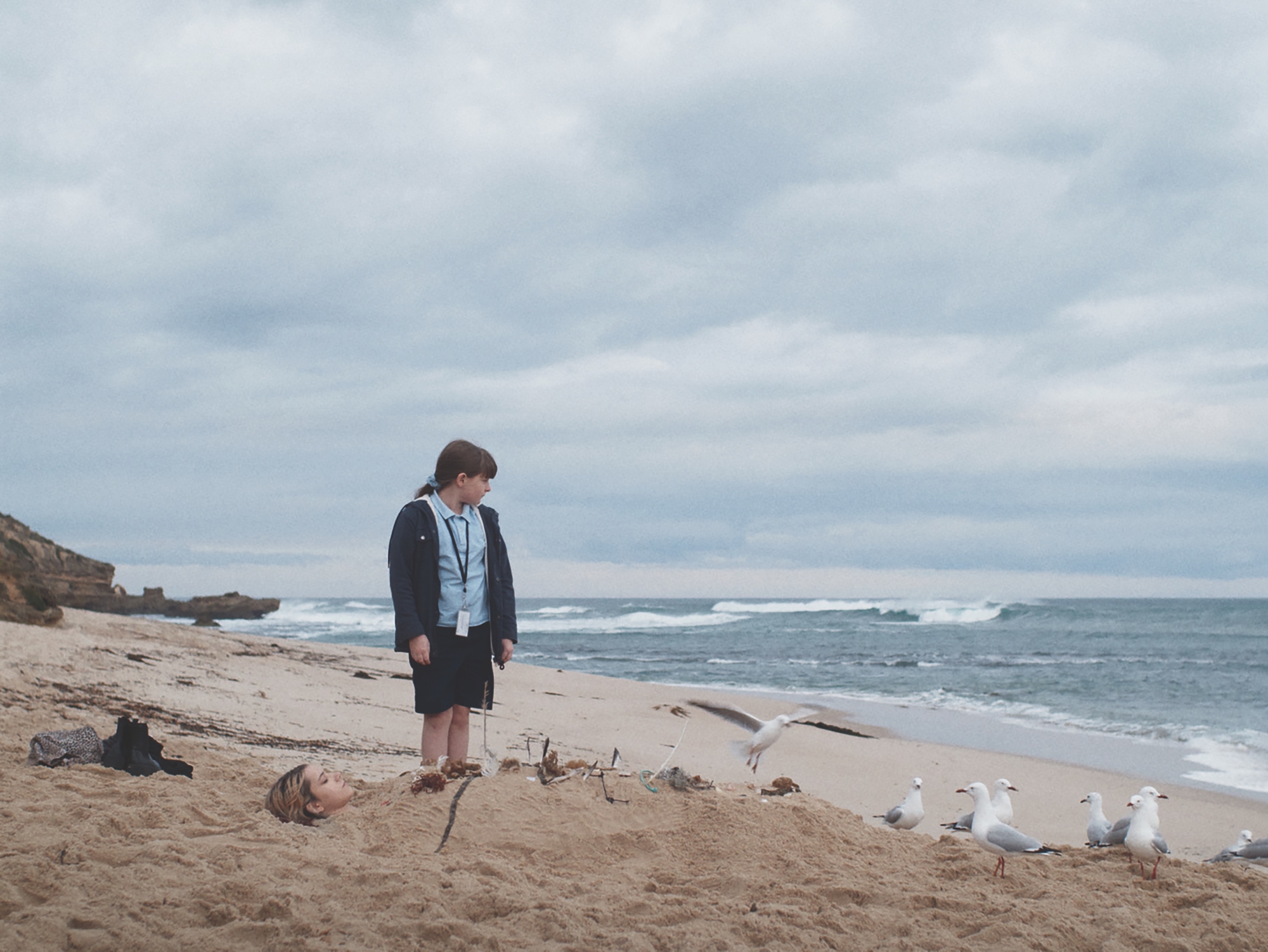Moja Vesna (Sara Kern, 2022) opens on a grey, empty beach, with a school-uniform-clad Moja (Loti Kovačič) patting sand over her older sister Vesna’s (Mackenzie Mazur) reclined body, so that only her head is visible. Instead of being a cheeky or playful act – a prank on her sleeping sister – it is imbued with some deeper meaning. There are no sounds but the rhythmic roar of the waves as Moja pensively places stones, shells and feathers onto her sister’s sand-covered form, like a ritual or spell. We can see from this scene alone Moja’s divergence from typical behaviours of childhood, that her relationship to play and storytelling is somehow different from others her age. Just as she cushions Vesna’s body in sand, protecting her from the blustery wind, Moja seeks to cushion things in story, creating small fictions to protect herself and others from the harsh truths of the world.
Moja Vesna is the debut feature film from Slovenian-Australian writer and director Kern, produced in partnership with the Slovenian Film Centre and the MIFF Premiere Fund. The film centres on a ten-year-old girl, the shy and thoughtful Moja, who lives with her family in an outer suburb of Melbourne. Moja’s circumstances have required her to mature faster than her peers, to assume the mantle of adulthood while she is still in primary school. Her mother has recently died in a violent car accident, a loss that is still raw in its newness and cannot be confronted directly beyond the wordless lighting of a candle at the crash site. On top of this, Moja’s beloved twenty-year-old sister, Vesna – with whom she shares a room – is heavily and unhappily pregnant, and it comes down to Moja to prepare for the baby’s arrival. Their Slovenian-born father, Miloš (Gregor Baković), is well-meaning yet distant, and cannot fill the gap that the death of Moja’s mother has left in her life.
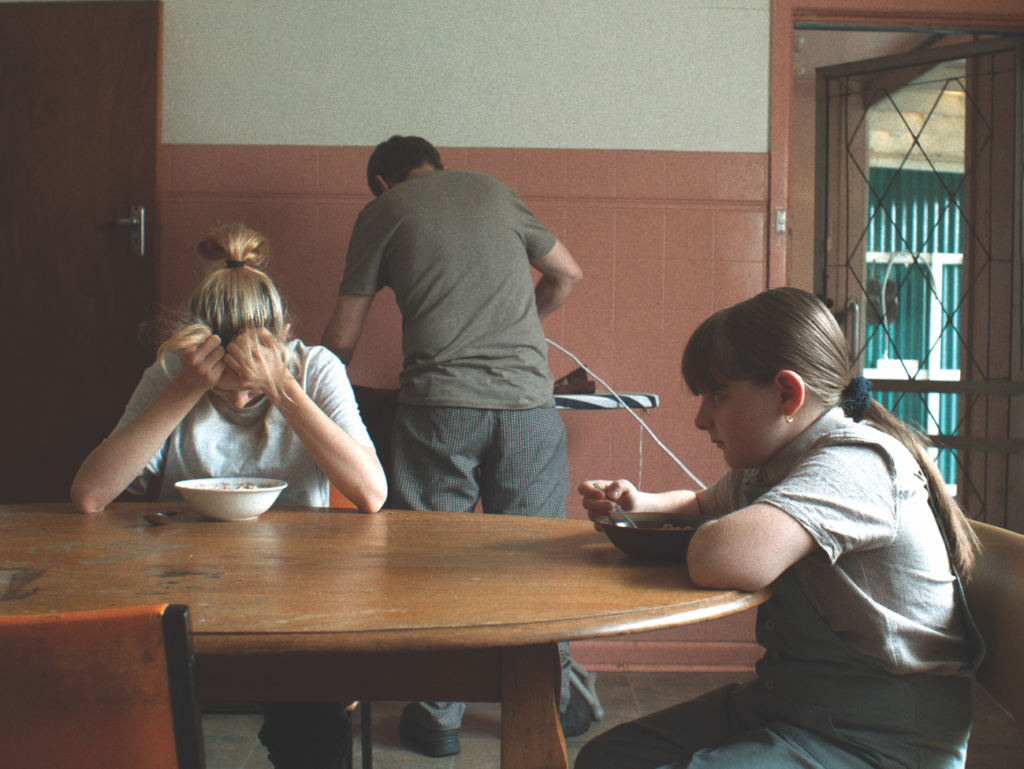
While Moja is resourceful and creative, her circumstances demand that her creativity is directed not towards idle play but to the creation of comforting stories as a means of survival. When she is alone, Moja talks to herself quietly in Slovenian, reciting a mantra of first aid instructions. This is a fantasy clearly tied to her mother’s recent death: ‘In case of major burns or multiple injuries, call for help immediately.’ As she whispers these words, she attempts to enter a fantastical world in which she has the agency of an adult; a world in which she has the tools to take action, to turn back the clock, to save and to heal; a world, in short, in which her mother is still alive. She retreats into this world as other children might a book or videogame.
Moja is positioned between two states: too young to be taken seriously by adults, but caught up in problems too serious to be able to fully engage with her peers.
Moja’s insular internal narrative separates her from others her age. As other kids spray one another with silly string on the school bus, Moja looks on from across the aisle, entertained yet removed, as if she were an adult watching younger people playing. At school, her peers laugh and run around her in the playground, acting out their own stories and games. That is peripheral to Moja, however; she is busy making phone calls to people who have placed advertisements online offering free baby clothes and equipment. This proves difficult – the person on the other end of the line does not take her seriously, thinking it’s a prank call. Moja is positioned between two states: too young to be taken seriously by adults, but caught up in problems too serious to be able to fully engage with her peers.
This sense of disconnection and separation from others is reinforced throughout the film by careful production design and framing. Moja is often pictured on the other side of glass windows and panels, removed from other people. It shows her emotional separation from others, how she cannot fully convey her feelings. While Vesna expresses herself through slam poetry performed for Moja – passionate and rhythmic rants about the state of her life and the world at large – the timid Moja lacks a similar outlet. Her father mentions that she still hasn’t cried about losing her mother; but it seems that Moja, the most mature and peaceful presence in the family, has no-one to cry to.
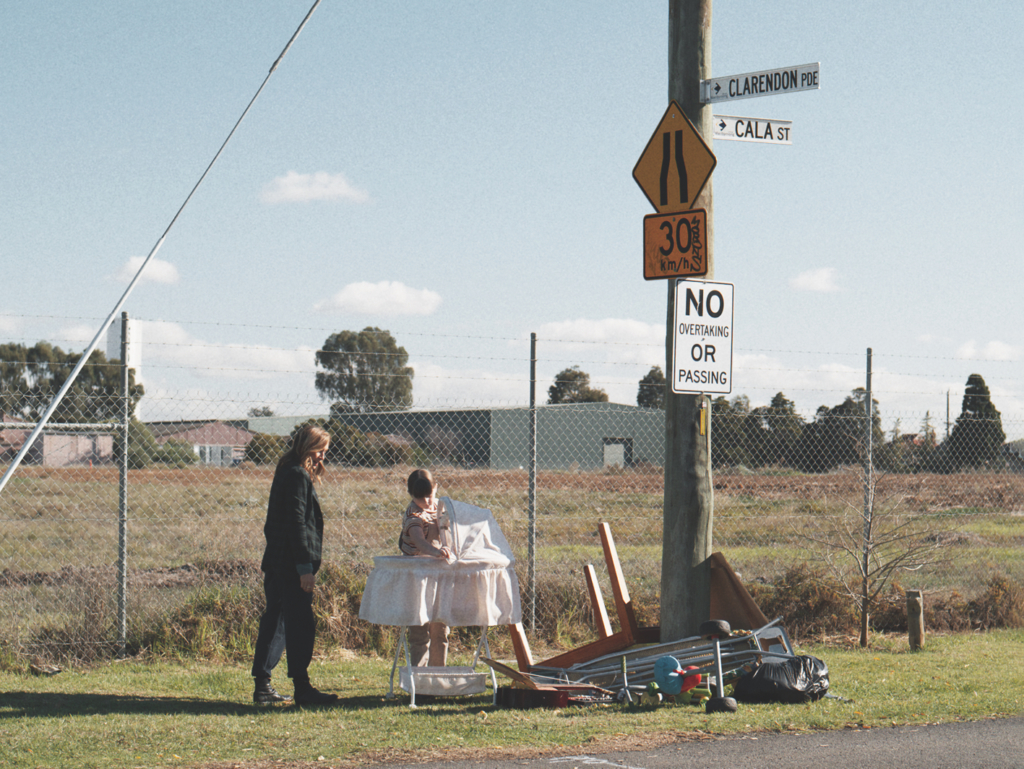
Moja is able to respond to one baby clothing advertisement via text message, and when she shows up at the door, the woman, Miranda (Claudia Karvan), is surprised to see a young girl in primary school uniform. ‘Your texts are so mature [that] I thought you were an adult,’ she tells her. Moja falters slightly, unwilling or unable to state the truth. ‘Um, it’s for my baby sister,’ she finally says, and thus begins a new story: one in which her mother is not only alive, but is also about to give life herself in place of her fatigued, unhappy sister; a story in which Moja will no longer be the youngest, but instead be cocooned as the middle child, both caring for her baby sister and being cared for herself.
Miranda has a daughter of her own around Moja’s age, Danger (Flora Feldman). In contrast to the film’s shy protagonist, this girl is confident and outspoken, and Moja is delighted when she proposes that the two of them become friends. After Miranda comes to Moja’s house to take back one of the donated items at her daughter’s request, Danger confides in her new friend, ‘My mum lets me drink from a baby bottle sometimes,’ to which Moja offers a muted ‘oh’ in reply. Such exchanges demonstrate the differences between the two girls, despite their similar ages: while one is permitted to idly return to and find comfort in the trappings of early childhood, the other is working hard to prepare those comforts for another child – one whom, her home life suggests, she will likely have a large hand in raising.
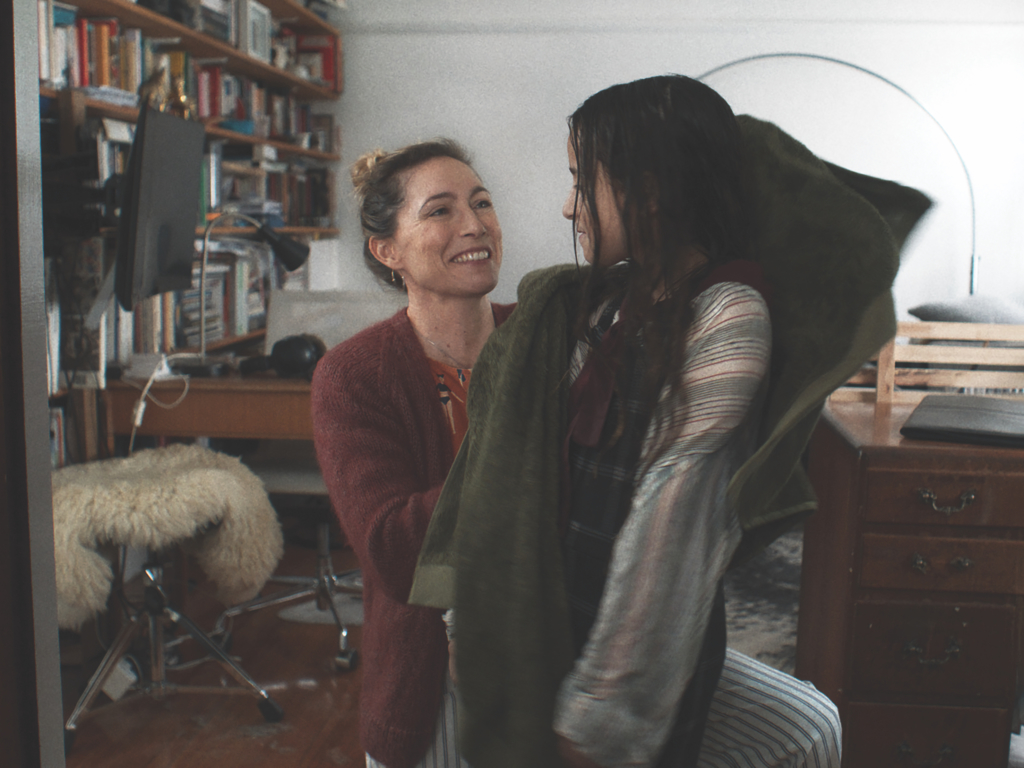
Despite drawing comfort from childhood and from the care of her mother, Danger also takes great joy in proclaiming and playing at independence. She is organising a ‘survival night’ party, in which, she tells Moja glibly, she and other children will sleep out in her backyard with ‘no adult access, and we just have to survive’. This imaginary world contrasts clearly with Moja’s, who is using her powers of storytelling to pretend that her mother is still in her life, as opposed to pretending she is gone.
Moja’s storytelling is not merely internal but also spreads out into the world around her. She diligently maintains her mother’s place at the family dining table, setting a clean plate, knife and fork, and glass of milk in front of what was always her mother’s chair. One of the only times Moja shows any kind of emotional outburst is when Vesna sits in the chair she has been assiduously guarding: ‘Get out of mum’s spot!’ she says, pushing her sister to the floor. On the wall behind the space where her mother ought to be, Moja has affixed a collage of photographs, drawings and colourful papers. This makeshift shrine is a physical act of mythmaking, small yet infused with love and yearning. The table-setting is an attempt to prolong her mother’s memory by creating a sense of liminality: a world in which her mother is not gone but is instead just down the hall, about to step inside for dinner.

This mythmaking comes to threaten the real relationship between the two sisters. Kern states that the name ‘Vesna’ comes from a figure in Slavic pagan mythology: a ‘goddess of spring […] bringing life and renewing nature’.[1]Sara Kern, ‘Director’s Statement’, in Sweetshop & Green and Cvinger Film, Moja Vesna press kit, p. 6. Fittingly, Vesna is a core part of Moja’s mythology, someone who, she hopes, can bring new life and renewal to their devastated family. When Danger comes over to visit, Moja lets her friend think that Vesna, lying on the ground with a towel over her face, is her mother. Vesna rejects this surrogate role, telling her plainly, ‘Stop pretending that I’m Mum.’ Moja’s determined collection of baby clothes and equipment from the side of the road reflects her desire for Vesna to step into a more maternal role, perhaps as much for Moja herself as for her future baby. In Vesna, she sees not just a sister but a chance for her mother to live on.
Yet Vesna repudiates Moja’s mythological, venerated reconstruction of their mother, with whom she had a strained relationship. Vesna has her own stories about their mother, whom she sees as a flawed, unhappy person who possibly crashed her car on purpose. Vesna tells Moja about a time she almost drowned as a child on a family holiday, a story tied to issues of neglect and estrangement with her mother that will now never be resolved. ‘Do you understand the story? Like, at all?’ she frustratedly asks her younger sister, who fails to see what Vesna wishes her to. Moja’s and Vesna’s separate internal narratives are incompatible, creating a rift in their relationship. This comes to a head when Vesna destroys their mother’s dining-room chair, smashing it and setting it alight. Moja discovers the charred remains thrown outside the back doorstep, as if part of some kind of ritual – as if a ghost has been exorcised from the house.
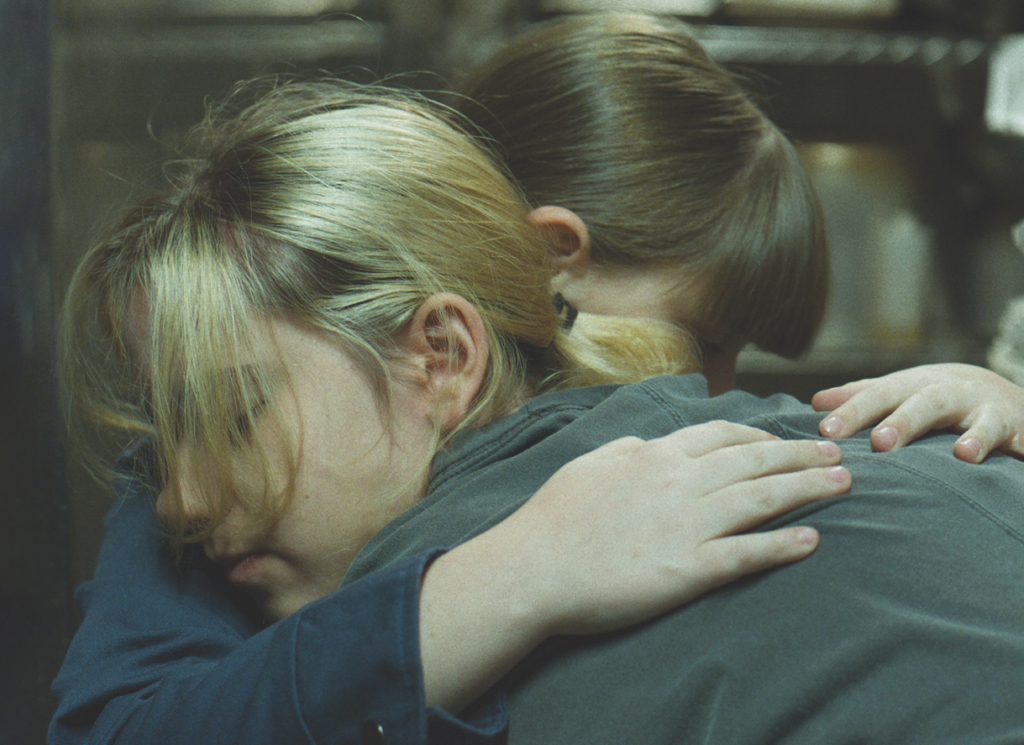
After Vesna has her baby, she takes Moja to a house party in an impulsive attempt to ‘feel normal’. Here Vesna tells Moja simply, embellished by neither story nor poetry, ‘I fucking love you. I’m serious – I fucking love you.’ On a mattress inside, she carefully tucks a blanket around her younger sister’s supine form so that only her head is visible at the top, mirroring the protective sand covering Moja made for her in the opening scene. Even with their clashing mythologies, the sisters’ relationship forms the tender heart of the film. The title of the film itself suggests a bond between the girls unbroken by punctuation or conjunction, an implicit understanding that these two need each other.
The title of the film itself suggests a bond between the girls unbroken by punctuation or conjunction, an implicit understanding that these two need each other.
Yet at this crucial point of understanding, Vesna seemingly vanishes into the night, finally shattering Moja’s myth of her as a saviour or replacement mother. This break, difficult as it is, allows Moja to see that she is truly alone; the myth that her mother is still alive is dissipated. It is at this point that Moja decides to end the story she has been telling herself and others. As she waits at the bus stop, she repeats to herself in Slovenian, ‘My mum died. My mum died. My mum died.’ The previous mantra of saving and administering aid, as calming as it might have been, has been replaced by the truth. As the bus carries her along, it feels like she’s leaving something behind, moving towards greater clarity.
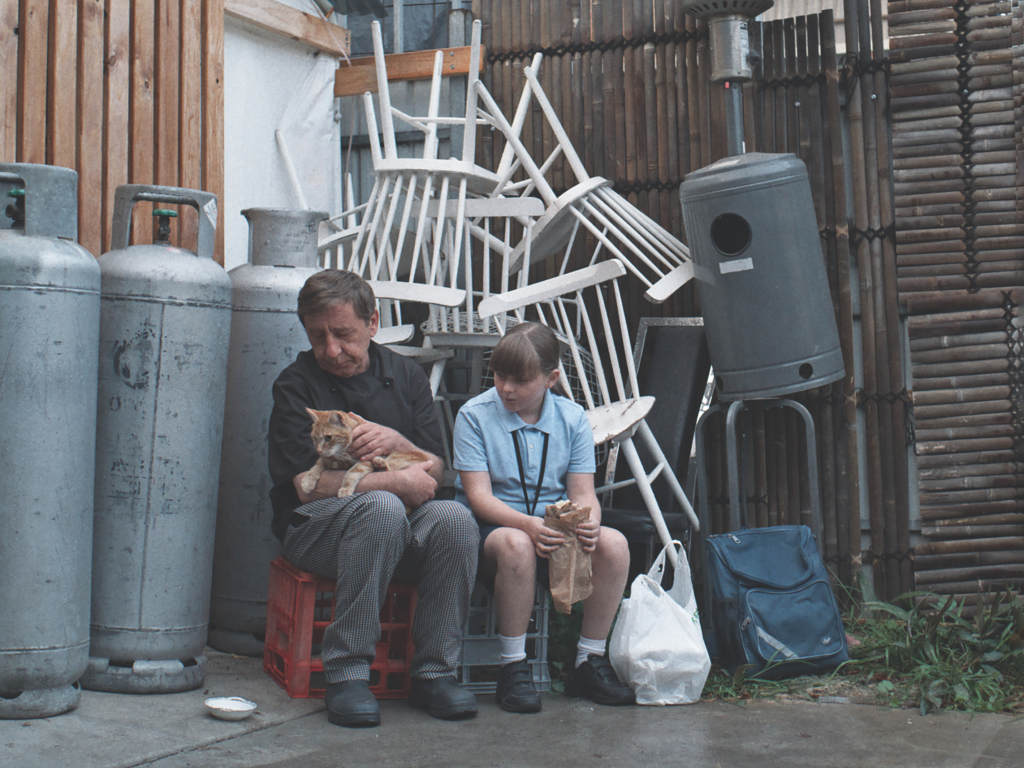
Moja ends up in Miranda’s backyard, standing among the cold remains of Danger’s ‘survival night’ party, which is already over; the children have returned to the warmth and comfort of their homes. As Moja allows herself to cry and be held by Miranda, she finally voices the truth: ‘I don’t really have a mum.’ In another film about childhood, the climactic dissipation of a childhood myth might signal the end of youth, or at least the beginning of the passage towards adulthood and greater maturity. Kern, however, allows in this moment a gentle return to girlhood, a retreat from the harshness of the world back into the loving embrace of a mother-figure.
In Moja Vesna, Kern uses the fertile ground of childhood to explore the bounds of personal mythmaking, the stories we tell ourselves and others. It’s an affecting investigation of what it means to play pretend, not only in childhood but also moving into adulthood – of how personal stories and myths are formed, and the freedom that can come from letting them go. The film’s lingering, wordless final scene, of Moja standing with her father and Vesna’s baby on the beach, conveys a sense of openness and renewal. It’s not clear where Moja’s story will go next, but at least other stories can now be told.
Endnotes
| 1 | Sara Kern, ‘Director’s Statement’, in Sweetshop & Green and Cvinger Film, Moja Vesna press kit, p. 6. |
|---|
